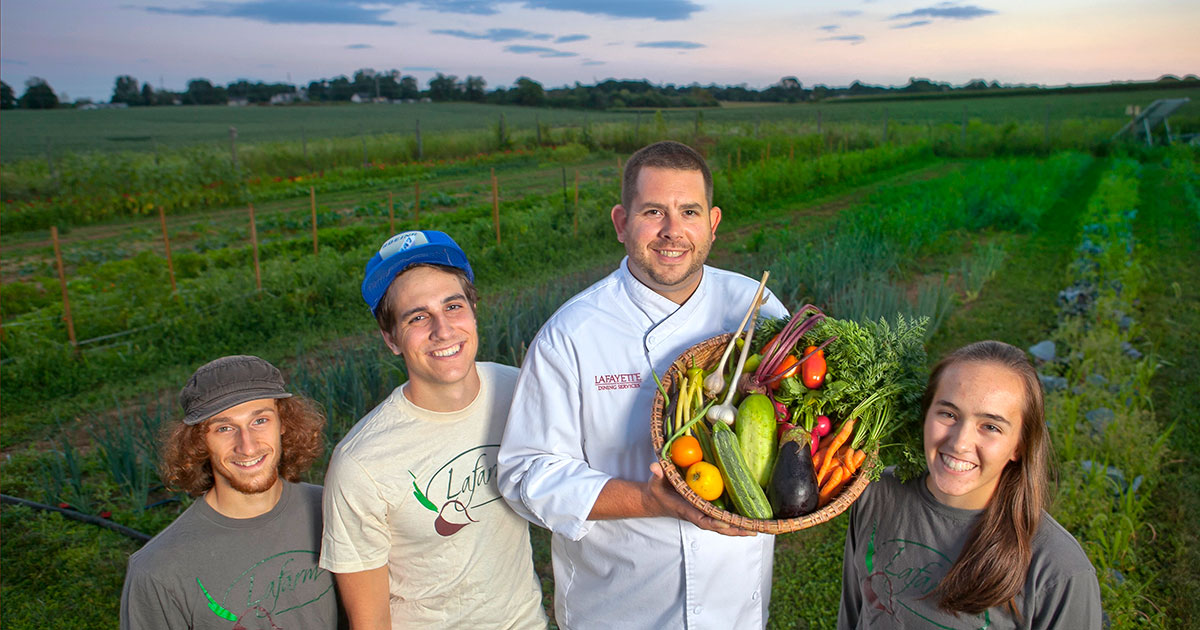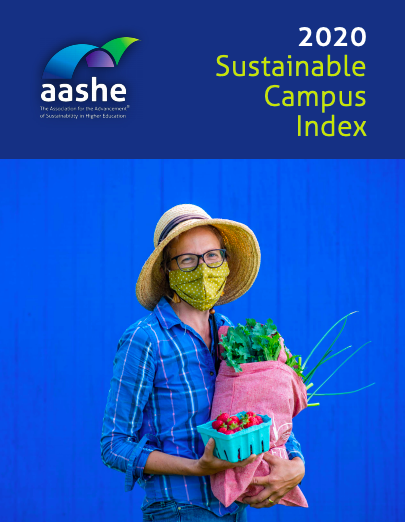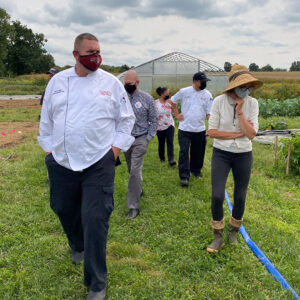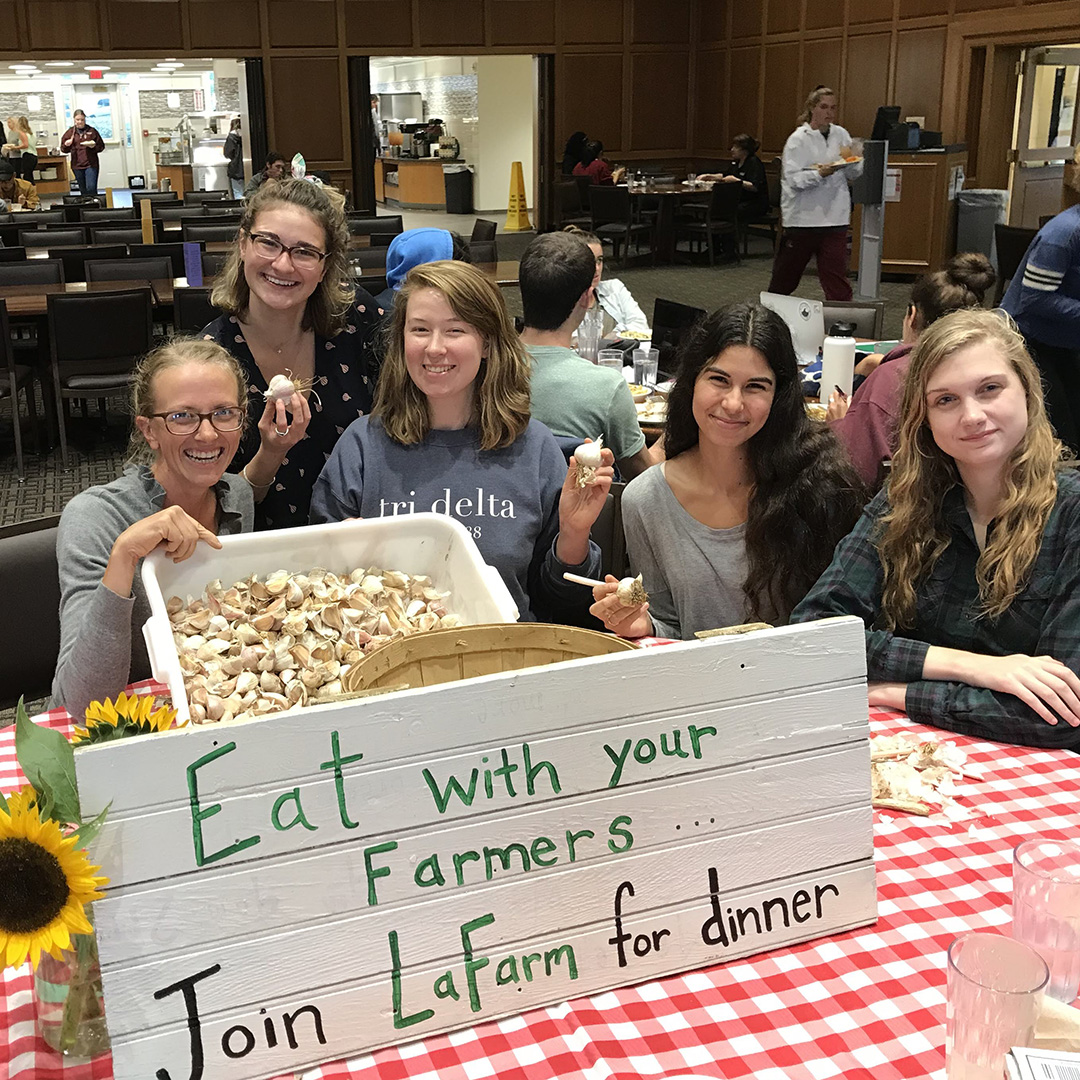The Roots of Lafayette College’s Sustainable Food and Dining Program
- by Peter Todaro

Bon Appétit Campus Executive Chef John Soder with students at small but mighty LaFarm, which grows more than 10,000 pounds of produce for Lafayette College dining halls and other destinations

Lisa Miskelly, LaFarm’s Assistant Director of Food and Farm, was featured on the cover of the Sustainable Campus Index
Congratulations to Bon Appétit partner Lafayette College, which was recently recognized as a top performer in the 2020 Sustainable Campus Index by the Association for the Advancement of Sustainability in Higher Education! The Easton, PA, college ranked in the top 10 for the food and dining category and received a silver rating for overall commitment to supporting a sustainable campus, as measured by AASHE’s Sustainability Tracking, Assessment & Rating System (STARS). Additional Bon Appétit clients — Colby College, the University of Pennsylvania, and Emory University — were honored in other categories.
Bon Appétit Campus Executive Chef John Soder has spent countless hours at Lafayette building deep and lasting relationships with some 20 Farm to Fork vendors across the rolling hills of the Lehigh Valley and in the Pocono Mountains to the north. Working with local farmers and producers requires chefs to possess a certain creativity — finding a way to menu the 50 extra pounds of butternut squash a vendor just harvested, or the bunches of basil they didn’t know they needed.
For John and the rest of the culinary team, the extra effort is a small price to pay. John now works with several farmers at the beginning of every growing season to help plan what they’ll grow and harvest for Lafayette Dining throughout the semester, such as Twin Maple Farm, which grows ten acres of potatoes exclusively for the Bon Appétit team every year. These season-long commitments, which John calls “handshake deals” that he’s “bound to honor,” are key for many area farmers. As one of the last commercial potato growers in Northampton County, which has been dramatically transformed by development in recent years, Twin Maple is trying to preserve a landscape and a way of life.

Assistant Director of Food and Farm Lisa Miskelly showed John and Bon Appétit staff around LaFarm this fall
But the closest and most important local-food partnership that the Lafayette Culinary team nurtures is with the Lafayette College Farm, or LaFarm, as it’s been affectionately referred to on campus. The crux of Lafayette’s “sustainable food loop,” LaFarm is run by Assistant Director of Food and Farm Lisa Miskelly — whose photo made the cover of AASHE’s Index — and a crew of enthusiastic students. On just 5 acres, they manage to grow more than 10,000 pounds of produce annually, which finds its way to the dining halls, local hunger-fighting nonprofits, and to the Lafayette community via an online store. Lisa and John have weekly conversations throughout the semester about what will be available at LaFarm, and what John can use in the kitchen, a constant give and take.
John cooks ingredients grown at LaFarm and other local farms and serves them in the campus’s dining hall, and any resulting food waste is collected, then composted, and used to fertilize crops at LaFarm and increase its soil fertility and carbon sequestration ability. In 2019, the College’s student compost management team collected and composted 14,491 pounds of campus food waste.
In addition to local purchasing and composting, other eco factors that were considered as part of the AASHE STARS evaluation of food and dining included whether the campus offers a sustainability-themed food outlet, focuses on plant-forward purchasing, offers plentiful vegan and vegetarian options, avoids food waste and practices food recovery and donation, and much more. The intricate web of collaboration that led to Lafayette’s recognition by AASHE has deep roots, involving passionate local farmers, creative chefs, diligent staff members, and curious students — and thus should thrive for decades to come.

Lisa led a garlic seed workshop at a previous Bon Appetit Eat Local Challenge